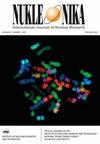The use of gamma irradiation to stimulate bioactive compound synthesis in Inonotus obliquus submerged cultures
IF 0.3
4区 物理与天体物理
Q4 CHEMISTRY, INORGANIC & NUCLEAR
引用次数: 1
Abstract
Abstract Inonotus obliquus is a parasite on the birch and other trees and is also a well-known medicinal mushroom. Its sterile conk is highly sought for its bioactive compounds such as phenols, polysaccharides, triterpenoids, and steroids. It was traditionally used to treat various gastrointestinal diseases, viral and parasitic infections, to counteract the progression of cancers, and to stimulate the immune system. We used acute gamma irradiation, followed by short-term submerged cultivation, as an oxidative stress inducer to enhance the synthesis of mycelial metabolites. The 300 Gy and 400 Gy doses showed the best results across the whole experimental design. Each assayed criterion had a different corresponding optimal stimulation dose. In one experiment, sublethal doses of irradiation triggered the dry weight of the cultured mycelium to increase by 19.764%. The free radical scavenging potential of the mycelium extracts increased by 79.83%. The total phenolic content of mycelium extracts and culture broth increased by 55.7% and 62.987%, respectively. The total flavonoid and sinapinic acid content of the broth increased by 934.678% and 590.395%, respectively. As such, gamma irradiation pre-treatment of the mycelial inoculum proved an interesting, economically and environmentally effective tool for stimulating secondary metabolite synthesis in submerged mycelium cultures.利用伽马射线照射刺激斜凤尾鱼深层培养物中生物活性化合物的合成
摘要斜孔菌是一种寄生在桦树和其他树木上的寄生虫,也是一种著名的药用蘑菇。其无菌锥因其具有酚类、多糖、三萜类和类固醇等生物活性化合物而备受青睐。传统上,它被用于治疗各种胃肠道疾病、病毒和寄生虫感染,以对抗癌症的进展,并刺激免疫系统。我们使用急性伽马辐射,然后进行短期深层培养,作为氧化应激诱导剂,以增强菌丝体代谢产物的合成。在整个实验设计中,300 Gy和400 Gy剂量显示出最好的结果。每个测定的标准具有不同的相应的最佳刺激剂量。在一个实验中,亚致死剂量的辐照使培养的菌丝体干重增加了19.764%,菌丝体提取物的自由基清除潜力增加了79.83%,菌丝体提取液和培养液的总酚含量分别增加了55.7%和62.987%。肉汤中总黄酮和芥子酸含量分别提高了934.678%和590.395%。因此,菌丝接种物的伽马辐射预处理被证明是一种有趣的、经济和环境有效的工具,用于刺激浸没菌丝培养物中次级代谢产物的合成。
本文章由计算机程序翻译,如有差异,请以英文原文为准。
求助全文
约1分钟内获得全文
求助全文
来源期刊

Nukleonika
物理-无机化学与核化学
CiteScore
2.00
自引率
0.00%
发文量
5
审稿时长
4-8 weeks
期刊介绍:
"Nukleonika" is an international peer-reviewed, scientific journal publishing original top quality papers on fundamental, experimental, applied and theoretical aspects of nuclear sciences.
The fields of research include:
radiochemistry, radiation measurements, application of radionuclides in various branches of science and technology, chemistry of f-block elements, radiation chemistry, radiation physics, activation analysis, nuclear medicine, radiobiology, radiation safety, nuclear industrial electronics, environmental protection, radioactive wastes, nuclear technologies in material and process engineering, radioisotope diagnostic methods of engineering objects, nuclear physics, nuclear reactors and nuclear power, reactor physics, nuclear safety, fuel cycle, reactor calculations, nuclear chemical engineering, nuclear fusion, plasma physics etc.
 求助内容:
求助内容: 应助结果提醒方式:
应助结果提醒方式:


